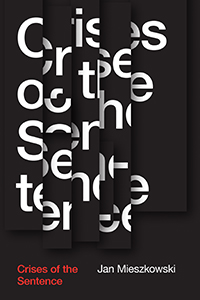
Jan Mieszkowski
Crises of the Sentence
University of Chicago Press
ISBN: 9780226617190
27,50 $
264 p.
PRESENTATION
There are few forms in which so much authority has been invested with so little reflection as the sentence. Though a fundamental unit of discourse, it has rarely been an explicit object of inquiry, often taking a back seat to concepts such as the word, trope, line, or stanza.
To understand what is at stake in thinking—or not thinking—about the sentence, Jan Mieszkowski looks at the difficulties confronting nineteenth- and twentieth-century authors when they try to explain what a sentence is and what it can do. From Romantic debates about the power of the stand-alone sentence, to the realist obsession with precision and revision, to modernist experiments with ungovernable forms, Mieszkowski explores the hidden allegiances behind our ever-changing stylistic ideals. By showing how an investment in superior writing has always been an ethical and a political as well as an aesthetic commitment, Crises of the Sentence offers a new perspective on our love-hate relationship with this fundamental compositional category.
CONTENTS
Acknowledgments
Introduction: What Is a Sentence?
1 Slogans and Other One-Liners
2 The Poetic Line
3 Sentences Terminable and Interminable
4 The Democratic Sentence
Conclusion: The Sentence Fetish
Index
REVIEWS
Charles Bernstein, author of Pitch of Poetry
“A poem is the cry of its sentences. Jan Mieszkowski explores how sentences are made, and broken, in aphorisms and slogans as well as in Schlegel, Poe, Dickinson, and Stein (among many others). Crises of the Sentence illuminates the aesthetics of literary style––as well as the style of literary aesthetics.”
Anne-Lise Francois, author of Open Secrets: The Literature of Uncounted Experience
“No book has given me such critical pleasure in a long while, in part thanks to the satisfaction afforded by the successive unfolding of Jan Mieszkowski’s own flawless sentences. I won’t call them elegantly crafted since he hasn’t manufactured them for the reader’s pleasure. Rather, the book’s virtue is to make us supremely aware of the strange capacity for one ‘complete thought’ to give way to another as a property inherent in all good prose.”